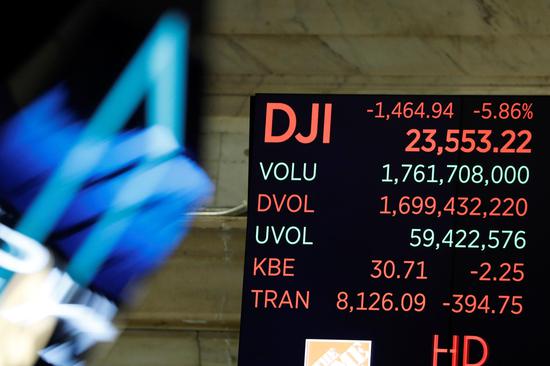
The Dow Jones Industrial Average is displayed after the closing bell on the floor of the New York Stock Exchange (NYSE) in New York City, New York, U.S., March 11, 2020. (Photo/Agencies)
The Dow plunged more than 1,400 points to end in a bear market on Wednesday in a continued wild session as coronavirus fears intensified on Wall Street.
The Dow Jones Industrial Average shed 1,464.94 points, or 5.86 percent, to 23,553.22. The 30-stock index fell into a bear market, down more than 20 percent from last month's record close.
The Dow, which fell by as many as 1,689.84 points at session lows, was the only index to close in bear-market territory. The S&P 500 decreased 140.85 points, or 4.89 percent, to finish at 2,741.38. The Nasdaq Composite Index dipped 392.20 points, or 4.70 percent, to 7,952.05.
Boeing stock nosedived 18.15 percent, leading the Dow's losses.
All the 11 primary S&P 500 sectors ended lower, with industrials falling 5.95 percent, the worst-performing group.
The Cboe Volatility Index, widely considered as the best fear gauge in the stock market, surged 13.95 percent to 53.90 on Wednesday.
On the bond market, the yield on the benchmark 10-year U.S. Treasury note, which moves inversely with prices, rose to 0.82 percent in volatile trading.
The World Health Organization (WHO) said on Wednesday that the COVID-19 outbreak can be characterized as a "pandemic" as the virus spreads increasingly worldwide, fueling market fears that the continued spread of the virus would disrupt global supply chain and slow economic growth.
The WHO is "deeply concerned both by the alarming levels of spread and severity, as well as by the alarming levels of inaction," said WHO Director-General Tedros Adhanom Ghebreyesus. He also urged the international community to take urgent and aggressive action to contain the pandemic.
The number of confirmed COVID-19 cases in the United States has topped 1,000. Investors were expecting a quick round of fiscal stimulus package from Washington to cushion the economic damage by the coronavirus epidemic. However, the lack of a clear roadmap for the U.S. stimulus plan did little to pacify the markets.
President Donald Trump said earlier this week that his administration was planning some "very dramatic" fiscal stimulus measures to support the economy.
The lack of specificity on what might be included in the plan, as well as concerns over the continued lack of cooperation on Capitol Hill, added to market jitters, experts noted.
"If it's too broad-based and difficult to implement in the near term, markets will grow skeptical; if it's too narrowly scoped and modest in scale, then markets will be disappointed," UBS Global Wealth Management's Americas Chief Investment Officer Mike Ryan said in a note, while commenting on the potential U.S. fiscal stimulus plan.
"The package must be large enough to restore confidence, but targeted enough to provide immediate relief to where it is needed most," Ryan noted.
Vicious market swing has become a routine for U.S. equities these days. The Dow closed up more than 1,100 points on Tuesday, following a 2,013.76-point dip in the prior session.
The massive sell-off shortly after Monday's opening triggered a key market circuit breaker on Wall Street and halted trading for 15 minutes.
Last week, the U.S. Federal Reserve lowered the target range for the federal funds rate by 50 basis points to 1-1.25 percent, its first emergency rate cut since the 2008 financial crisis as COVID-19 posed "evolving risks" to economic activity.

- China to further relax market access for cross-border trade in services
- RCEP facilitates ASEAN products’ access to Chinese market
- AC352 helicopter cleared to enter market
- New utility helicopter cleared to enter market
- 3 years on, STAR Market savors trendsetter record
- Online festival helps bring SE Asian fruit to Chinese market
Popular Videos
Hot comments
- First apes at U.S. zoo receive COVID-19 vaccine made for animals, zoo official says
- China Life: Chinese women shine with She Power
- Foreign firms approved to offer VPN services in capital
- Homemade curling videos trending in China
- 86-year-old grandma in Hebei spends most her life on traditional cheongsam
- Winners of 2022 Inaugural WLA Prize announced
- Lantern Festival: A romantic celebration in China
- Two Chinese COVID-19 vaccine firms to supply vaccines to COVAX
- Media center for 20th CPC national congress to open on Oct. 12
- Six suspects arrested in HK for role in SE Asia job scam
Top Reviews
- Young artists recreate beauty of traditional Hanfu costume
- China releases photos of tallest tree
- English version of ‘Understanding Xi Jinping’s Educational Philosophy’ published
- China crowned in men’s team for 10th straight time at table tennis worlds
- China publishes Atlas of Wildlife in SW China
- Guangxi’s 10 Years: A Visit to China’s Qinzhou Port
- Congress delegate helped lift village out of poverty
- Expo highlights joint efforts in NEV development
- Racism stain of shame on ‘world democratic paradise’
- U.S. may face new COVID wave this upcoming winter: report







